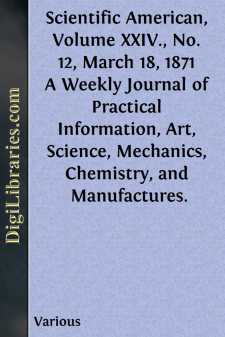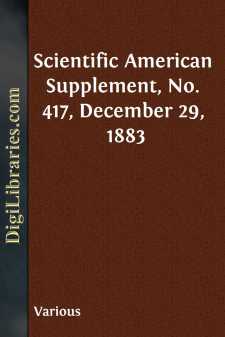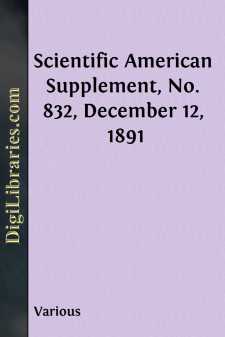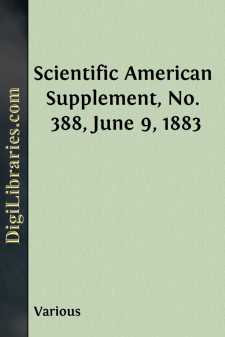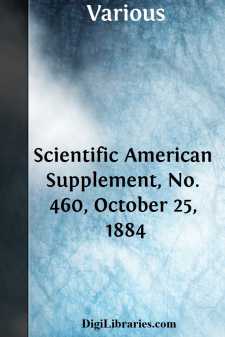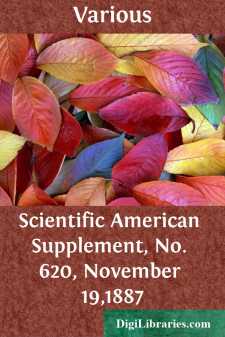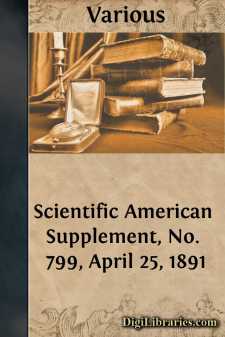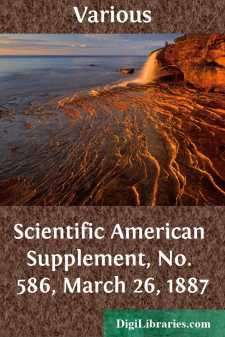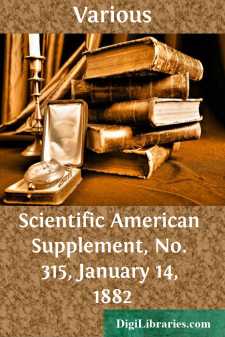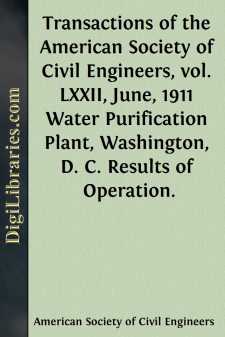Periodicals
- Art 27
- Children's periodicals 59
- Entertainment 5
- Food/Wine 2
- Games/Humor 455
- General 661
- Health 1
- History 53
- House/Home 1
- Regional 62
- Science/Nature
- Transportation 10
Science/Nature Books
Sort by:
by:
Various
There has recently been a most interesting discussion at the Literary and Philosophical Society, Manchester, on the above subject. The paper which gave rise to the discussion was by Mr. Brockbank, who detailed many experiments, and ended by stating his opinion that iron does become much weaker, both in its cast and wrought states, under the influence of low temperature; but Mr. Brockbank's paper...
more...
by:
Various
In my presidential address, which I had the pleasure of reading before this society at our first meeting this year, I called attention, somewhat hurriedly, to the results of a few of my experiments on induction, and at the same time expressed a hope that at a future date I might be able to bring them more prominently before you. That date has now arrived, and my endeavor this evening will be to...
more...
by:
Various
ARCHÆOLOGICAL DISCOVERIES AT CADIZ. Those who have had the good fortune to visit Andalusia, that privileged land of the sun, of light, songs, dances, beautiful girls, and bull fighters, preserve, among many other poetical and pleasing recollections, that of election to antique and smiling Cadiz—the "pearl of the ocean and the silver cup," as the Andalusians say in their harmonious and...
more...
by:
Various
FARCOT'S IMPROVED WOOLF COMPOUND ENGINE. In a preceding article, we have described a ventilator which is in use at the Decazeville coal mines, and which is capable of furnishing, per second, 20 cubic meters of air whose pressure must be able to vary between 30 and 80 millimeters. In order to actuate such an apparatus, it was necessary to have a motor that was possessed of great elasticity, and...
more...
by:
Various
LINKS IN THE HISTORY OF THE LOCOMOTIVE. It is, perhaps, more difficult to write accurate history than anything else, and this is true not only of nations, kings, politicians, or wars, but of events and things witnessed or called into existence in every-day life. In The Engineer for September 17, 1880, we did our best to place a true statement of the facts concerning the Rocket before our readers. In...
more...
by:
Various
BRISTOL CATHEDRAL. BRISTOL CATHEDRAL. An Augustinian monastery, founded by Robert Fitzhardinge in 1142, had its church, of Norman architecture, to which additions were made in the early English period. When Edmund Knowle was abbot, from 1306 to 1332, the Norman choir was replaced by that which now exists. His successor, Abbot Snow, built the chapels on the south side of the choir. Abbot Newland,...
more...
by:
Various
THE NEW GERMAN DISPATCH BOAT METEOR. In time of war the dispatch boats are the eyes of the fleet. It is their duty to reconnoiter and ascertain the strength of the enemy and to carry the orders of the commander. For this service great speed is of the utmost importance. As all nations have increased the speed of their war ships during the last few years, it has become necessary to build faster dispatch...
more...
by:
Various
THE RETIRO VIADUCT. We give engravings of the viaduct over the river Retiro, Brazil, our illustrations being reproduced by permission from the Proceedings of the Institution of Civil Engineers. In a "selected paper" contributed to the volume of these proceedings just published, Mr. Jorge Rademaker Grunewald, Memb. Inst. C.E., describes the work as follows: VIADUCT OVER THE RETIRO, BRAZIL....
more...
by:
Various
In admiring the recent developments of electric science as evidenced by the number of important inventions which have during the past few years been given to the world, especially in those branches of applied science which deal more particularly with the generation of electricity and the production of the electric light, there is often too great a tendency to forget, or, at least, to pass over in...
more...
~With Discussion by Messrs. Allen Hazen, George A. Johnson,Morris Knowles, George C. Whipple, F. F. Longley, and E. D. Hardy.~ The Washington filtration plant has already been fully described.[2] At the time that paper was written (November, 1906), the filtration plant had been in operation for only about 1 year. It has now been in continuous operation for 5 years, and many data on the cost,...
more...


